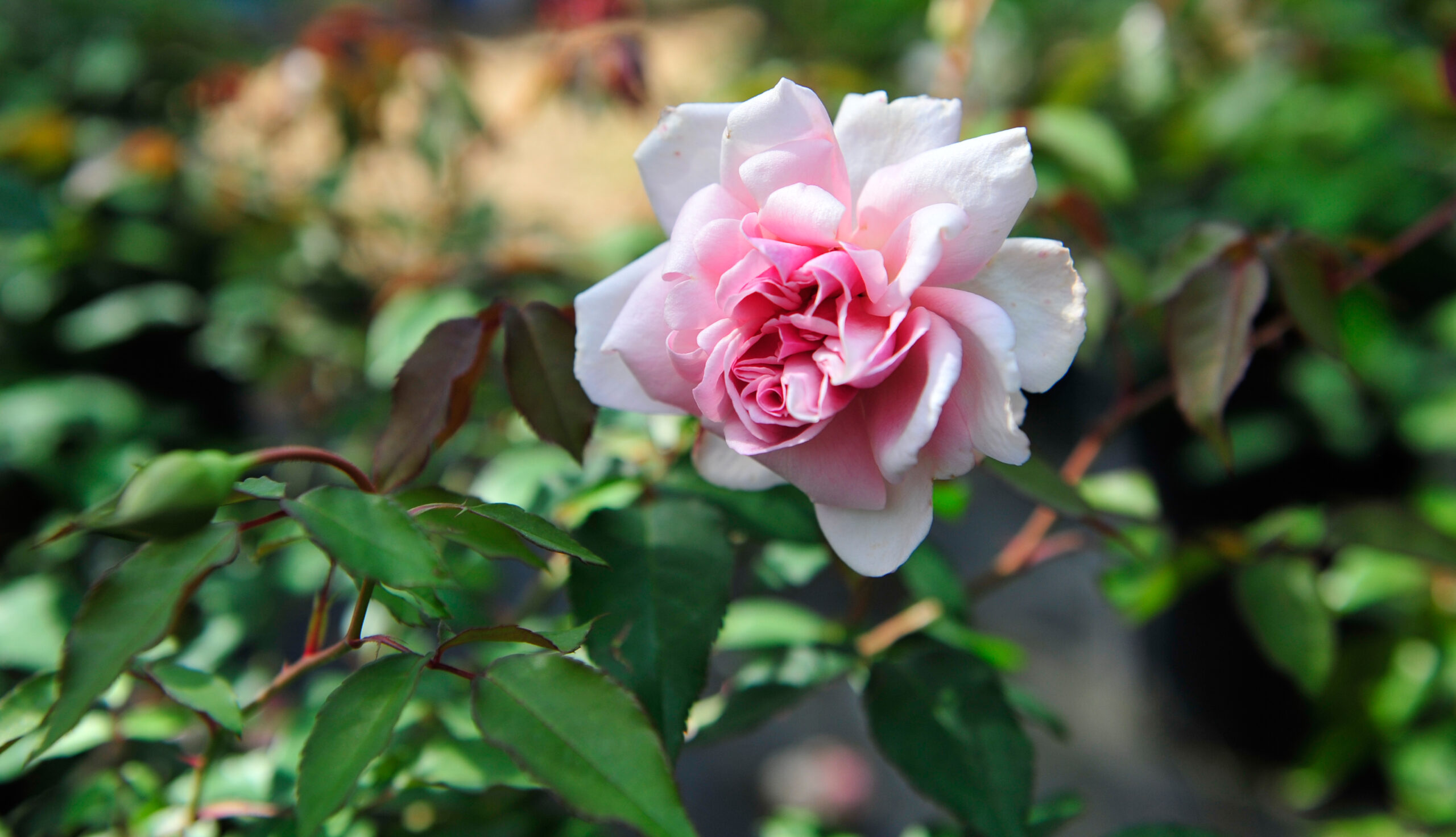
We just got in a shipment of really great roses, and I’m really excited about them. These roses have special roots, called Fortuniana rootstock. These special roots help the roses growing on top of them to be stronger and live longer. Before we take a look at how these special plants can work for you, I’d like first to explain what all this talk of rootstock is about.
Most nursery plants are reproduced by cloning existing plants that have shown themselves to be extraordinary. Luckily, cloning plants is a whole lot easier than cloning animals. The most common method to clone a plant, is to make a cutting. Cuttings are just small branches that are clipped off of the desired plant. Through proper timing and care these branches are encouraged to grow their own roots. A rooted cutting is basically a tiny version of the plant you started with. While roses reproduce easily through cuttings, many types of roses will grow much stronger if they are fused with special roots.
 Grafting is the process of joining two different plants together, the top (scion) and the roots (rootstock). The top of the grafted plant will be the pretty flowers you want to see. That’s the named part like Don Juan, Double Delight, or Belinda’s Dream. While the choice of rootstock won’t change what type of flowers you’ll see, it can make a huge difference in the health and vigor of your plants. Healthier plants mean more flowers and less work.
Grafting is the process of joining two different plants together, the top (scion) and the roots (rootstock). The top of the grafted plant will be the pretty flowers you want to see. That’s the named part like Don Juan, Double Delight, or Belinda’s Dream. While the choice of rootstock won’t change what type of flowers you’ll see, it can make a huge difference in the health and vigor of your plants. Healthier plants mean more flowers and less work.
Fortuniana rootstock produces an extensive network of roots. These strong and abundant roots are able to shuttle more water and nutrients from the soil back to the plant. This makes Fortuniana a great choice for growing roses in sandier soils. Anyone trying to grow roses close to the coast will greatly appreciate this ability. Fortuniana’s roots are also resistant to nematodes. Nematodes are a pest found most commonly in sandy soils that can destroy plant roots. If your soil is on the sandier side, Fortuniana rootstock can make growing roses a reality for your garden.
We all know how hot and miserable North Florida is each summer. That weather is just as hard on most plants as it is on us gardeners. Many roses live rather short lives in our area due to the intense stress of heat and humidity each year. Fortuniana has an answer to that problem too. Roses grafted to Fortuniana rootstock live much longer than others. Fortuniana grafted roses can live 40 years or more in Florida. That’s an extremely long time for a rose in our climate. If you want your botanical investment to last as long as possible, be sure your roses are grafted to Fortuniana roots.
I’ve saved the real show stopper for last. Rose bushes are all about the flowers, and when it comes to rose blooms, bigger is better. I wish there could be more nuance to this discussion, but the fact stands. Bigger flowers get more attention. The largest flowers, for any given variety of roses, will always be grown on Fortuniana rootstock. It takes a few years for Fortuniana roots to reach their potential, but once mature, they allow roses to produce more flowers of larger size than roses on other rootstocks.
Despite what it sounds like, Fortuniana rootstock isn’t magical. There are a few drawbacks. For me, the major drawback is slow starting. Roses on Fortuniana rootstock generally grow slowly when they are young. They will still bloom plenty, but a couple years in the ground are needed to see the full impact of what these great roots can do for a rose. Other rootstocks produce a bigger show earlier, but lack the longevity of Fortuniana. Just try not to judge a rose on Fortuniana roots too harshly while it is still in its pot, the garden is where it belongs. The slower early growth means many branches can’t support the weight of their blooms. Staking is a must for roses on Fortuniana for at least the first year or two, which is a little more work upfront.
Roses with Fortuniana rootstock can help you achieve stronger, healthier plants, with bigger blooms, for more years. However, all those great attributes can be lost if you overlook these great choices when you’re selecting roses. Fortuniana rootstock roses are like a garden investment. You start with something small, but in time, it grows into an amazing payoff.
As of January 20, 2020
All our roses in the bright blue pots have Fortuniana roots. 40+ Varieties.
Hybrid Tea
Alec’s Red
Beverly
Calico
Christian Dior
Double Delight
Francis Meilland
Flo Nelson
Granada
Kentucky Derby
Marco Polo
McCartney
Mister Lincoln
New Zealand
Pope John Paul II
Perfume Delight
Pricness Charlene de Monaco
Rio Samba
Secret
St. Patrick
Tahitian Sunset
Veterans Honor
White Christmas
Floribunda
Belinda’s Dream
Iceberg
Oh My!
Our Lady of Guadalupe
Sunsprite
Scentimental
Grandiflora
Crimson Bouquet
Gold Medal
Love
Shrub
Distant Drums
Peppermint
Climbing
Don Juan
Pearly Gates
Pinata
Weeping China Doll
Antique
Josephine Land
Louis Philippe
La Marne
Prosperity
Souvenir de la Malmaison
Shop early for the best selection!
*This article was written by Jonathan Burns (Tallahassee Nurseries Outdoor Manager, FNGLA Florida Certified Horticulture Professional)

